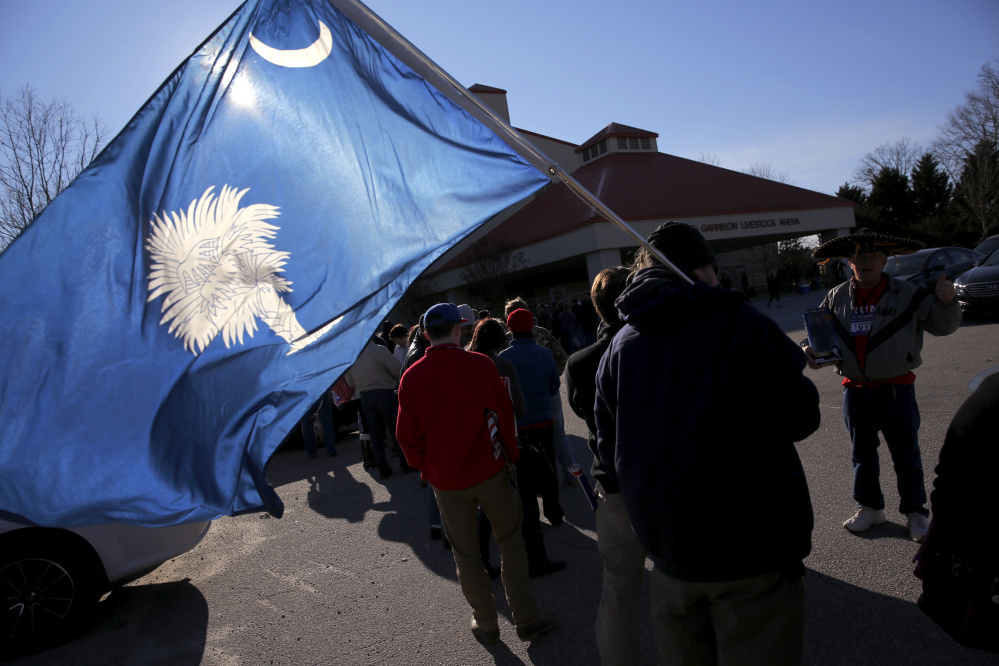COLUMBIA, S.C. — Hoping for survival in the South, a muddled field of Republican presidential contenders descended Wednesday on South Carolina, no closer to clarity about who can stand between Donald Trump and their party’s nomination.
Not me, Carly Fiorina announced, dropping out of the campaign. A Chris Christie spokeswoman said his race was over, too. But a sizable field remained. To the dismay of party leaders, all signs point to a drawn-out battle for delegates following Trump’s resounding victory in New Hampshire. Florida Sen. Marco Rubio, under pressure to prove himself after a devastating fifth-place finish, was looking for a fight that could spill into the first contested Republican national convention since 1976.
“We very easily could be looking at May – or the convention,” Rubio campaign manager Terry Sullivan said.
If Trump had Republicans on edge, Democrats were feeling no less queasy.
Rejected in New Hampshire, Hillary Clinton sought redemption in Nevada, where a more diverse group of voters awaited her and Bernie Sanders.
Sanders raised $5 million-plus in less than a day after his New Hampshire triumph. The contributions came mostly in small-dollar amounts, his campaign said, illustrating the resources he’ll have to fight Clinton to a bitter end.
Both Clinton and Sanders worked to undercut each other among African-Americans and Hispanics with less than two weeks until the Democratic contests in Nevada and South Carolina.
Sanders met in Harlem with the Rev. Al Sharpton. Clinton, meanwhile, announced plans to campaign with the mother of Sandra Bland, whose death while in police custody became a symbol of racial tensions.
Texas Sen. Ted Cruz, the conservative firebrand and victor in the leadoff Iowa caucuses, returned to the center of the fracas after largely sitting out New Hampshire. He drew contrasts with Trump as he told a crowd of 500 in Myrtle Beach that Texans and South Carolinians are more alike than not.
“We love God, we’re gun owners, military veterans and we’re fed up with what’s happening in Washington,” Cruz said.
Almost all the Republicans have spent months building complex campaigns and blanketing airwaves in South Carolina, which heralds the start of the campaign’s foray into the South. The state, with its array of conservative Republican voters, will test Trump and the others in new ways. Having courted social conservatives in Iowa and moderates in New Hampshire, the candidates face an electorate infused with evangelical, pro-business and military-minded flavors.
Rubio’s campaign has looked forward to the state. Yet his path grew far trickier after a fifth-place New Hampshire letdown, which terminated talk of Republican leaders quickly uniting behind him as the strongest alternative to “outsiders” Trump and Cruz.
For Gov. John Kasich, whose second-place showing was New Hampshire’s primary stunner, the task was to convert newfound interest into support in a state ideologically distant from his native Ohio. With a minimal South Carolina operation, Kasich must work quickly.
“If you don’t go to the gym, you get flabby,” Kasich said in Charleston. “And if the country doesn’t solve its problems, it gets flabby.”
Heading into the final two-week sprint, Trump was leading in South Carolina among all demographic groups, an NBC/Marist/Wall Street Journal poll showed, with Cruz and Rubio a distant second and third. Already, more than $32 million has been spent on TV ads here, according to CMAG/Kantar Media data – much of it by Right to Rise, the PAC backing Jeb Bush.
Though he placed fourth on Tuesday, Bush was hoping that Rubio’s slump would forestall his own ouster from the race.
Copy the Story LinkSend questions/comments to the editors.



Success. Please wait for the page to reload. If the page does not reload within 5 seconds, please refresh the page.
Enter your email and password to access comments.
Hi, to comment on stories you must . This profile is in addition to your subscription and website login.
Already have a commenting profile? .
Invalid username/password.
Please check your email to confirm and complete your registration.
Only subscribers are eligible to post comments. Please subscribe or login first for digital access. Here’s why.
Use the form below to reset your password. When you've submitted your account email, we will send an email with a reset code.